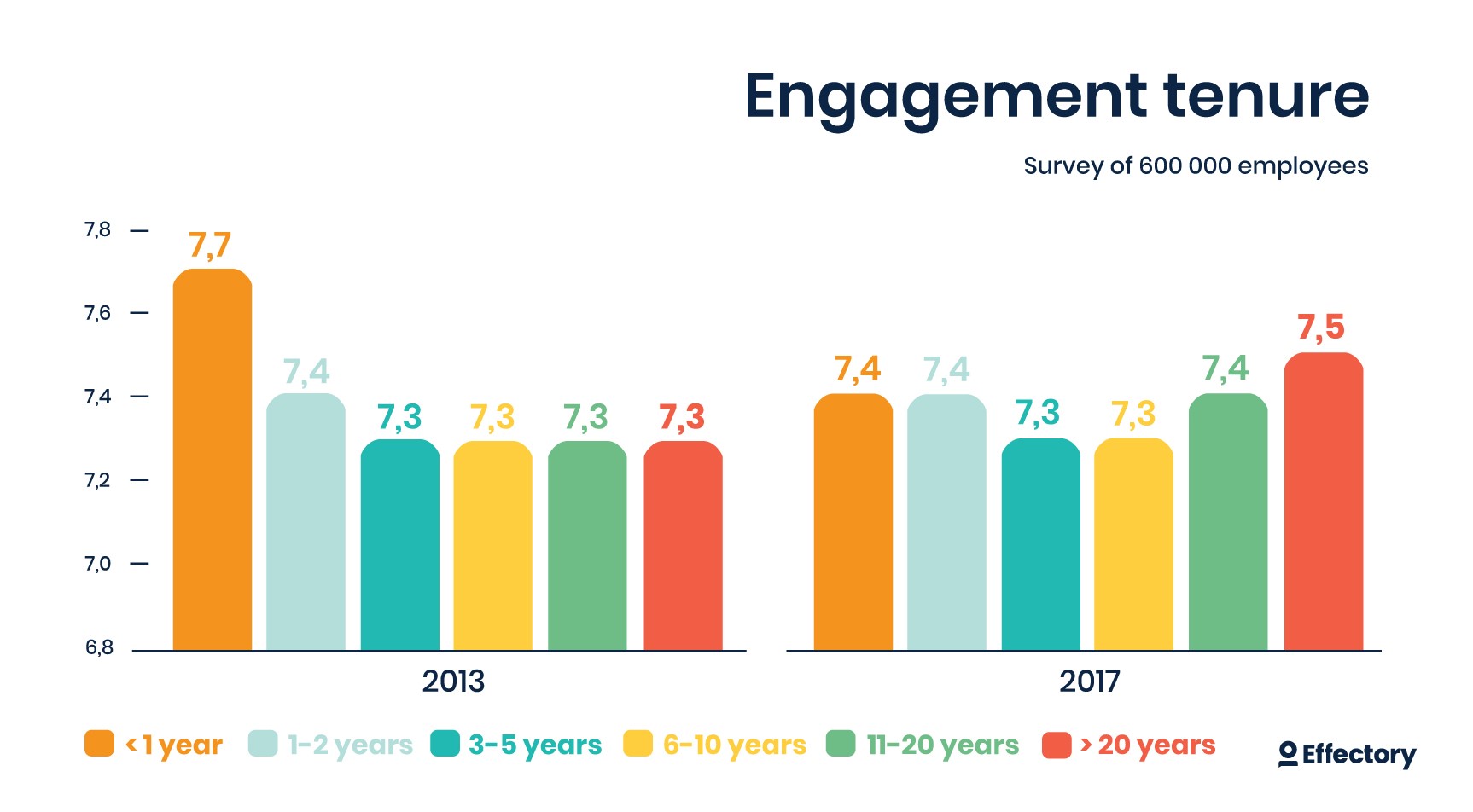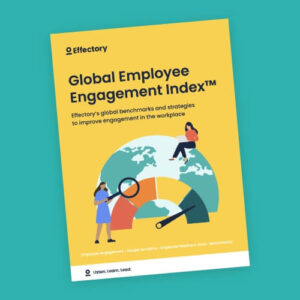In 2013, graduates entering the labor market started out with high levels of engagement. In The Netherlands for example, employee engagement scores of young people up to 25 years reached 7.7. Over the last four years, that figure has dropped to a score of 7.1, according to research by Effectory of more than 600,000 Dutch employees. How did that score plummet and what can organizations do to reverse the trend to give Gen Y an employee engagement boost?
Gen Y needs a boost in employee engagement

Younger employees always stood out in our research figures. They created a happy peak in the employee engagement levels of organizations here in The Netherlands. Like an exuberant pack of puppies, they started working enthusiastically at companies at the beginning of their career. After a while, their enthusiasm cooled, most likely because they discovered it is difficult to create paradise in traditional organizations. They left, or they stayed and searched for different ways to find pleasure in their work.
The Office
Much has changed in the labor market in recent years. In the war for top talent, organizations are now shouting over each other to tell the world what a great workplace they offer. They focus not only onboarding, but also pre-boarding. They banter loudly about the employee journey. But they fail to understand one crucial step: once young people are onboard, they are often left disappointed. A dynamic work environment was pitched to them, but they step into an episode of The Office.
Yes, organizations are less traditional than they used to be. Management layers are being been stripped away and the agile mindset is becoming increasingly common.
But a lot still needs to be done. New employees still butt their heads against departmental walls or are forced to work from a straitjacket of rules and protocols. And if they dare stick their necks out, they risk getting entangled in politics. Such restrictions cause great disappointment and lead to disengagement.
Impact of tenure on engagement
Our research shows employees who have been employed for more than 20 years are in fact more engaged than employees who have just started. In 2013, employees who had been with an organization for less than a year scored high with 7.7 for engagement, but this dropped to 7.4. In contrast, employees with a longer tenure revealed that their engagement scores increased from 7.3 to 7.5 over the same period, from 2013 to 2017. It may be a slight increase, but one would likely have expected the reverse to occur.

Tesla at the top
Low levels of enagement among new employees has another underlying factor: it is not easy to keep younger generations in one place for long. As true digital natives, they can see straight through slick employer marketing. They’re more connected than ever before and their skeptical attitude makes it difficult for many organizations to attract talent, let alone retain it.
Compare Tesla and Shell for example. From 2015 to 2017, the oil and gas group dropped from third to seventh place as a top employer among students in IT, natural sciences and technology. Such graduates prefer to launch their careers at innovative start-ups – organizations like Tesla that are taking the transition to sustainable energy resources seriously.
Not surprising then that Tesla currently sits at the top of the rankings. One student at the Delft University of Technology contended after a lecture by Shell CEO Ben van Beurden that as a Shell employee, he would have to “answer all the time” to management structures. “I do not know if I can handle that in ten years’ time,” he told a local newspaper.
At their fingertips
This student jabs at the sore spot: too much focus on structure. We’re seeing that what younger employees want is to work for an organization that contributes to the greater good of the world. This is not only because they’ve grown up connected through social media and therefore have guarded their image well to be seen making a difference. It is also because they choose to make a difference in the current labor market. And because they have heard and read throughout their childhood that our natural habitat is dying off and needs change to take place rapidly. The need is real.
What’s in a name?
It seems fair to suggest that Gen Y will not likely want to work at chemical giant Bayer, now that it has incorporated Monsanto. This producer of genetically modified seeds and pesticides for agriculture is notorious among environmental organizations, mainly because of the controversial agricultural poison Roundup. Even a much publicized name change won’t make much difference in the minds of young job seekers.
Global Employee Engagement Index™
Discover the Global Employee Engagement Index™ 2025 for key insights on driving employee engagement, improving performance, and enhancing team dynamics.
DownloadChange from the inside
This critical attitude of younger employees requires organizations to sit up and pay attention. They are being asked to become truly society-oriented and to choose a purpose that is good for the world. You can count on being watched with a keen eye.
Take Google as another example. At the end of May, Google decided not to renew a controversial military AI contract with the Pentagon, because several project participants had resigned, and 4 000 Google employees had signed a petition. A wise decision.
As the authoritative tech site Wired puts it: “Google is not the only large tech company to work with the military, nor would stopping the contract prevent the military from getting its hands on AI technology. But Google has a culture of allowing employees to speak up on internal message boards, a rosy mission to make information “accessible and useful” and an oft-cited motto of “don’t be evil.”
Do not cause damage. Do no harm. I expect that organizations that do not heed such an example will be mercilessly judged by applicants and their own employees. Positive change will increasingly come from within.
The solution? Agility and self-management
Younger employees are averse to procedures and do not automatically believe in the authority of managers. The more management layers in place, the more bureaucratic and more focused on control the organization becomes. This reduces employee engagement and commitment.
As your organization grows, you do not have to opt for extra management layers. You can also enable self-organizing teams. Real talent will then have a chance to show you what it can achieve. And if your employees feel valued and that they can reciprocate with real value in the work they do too, and they will be less likely to leave for a competitor.
Times continue to change. Why would you continue subjecting your employees to an abundance of outdated procedures? From scale-ups to multinationals, there is much still to learn from an agile way of working.
Start by listening to the ideas of all your employees. This way you increase open dialogue, foster more innovation, develop a culture of improvement, and at the same time show appreciation for their contribution. Employees will also feel that they are doing more meaningful work and are part of a bigger picture. And to top it off, you’ll make your organization more sustainable in the long run.
If you would like to discover how your employees can drive growth and innovation in your organization, discover Effectory’s employee feedback suite for the entire employee journey.
Solutions
Engaged employees are the key to organizational success. Our feedback tools help them to achieve business goals and drive customer happiness
Download